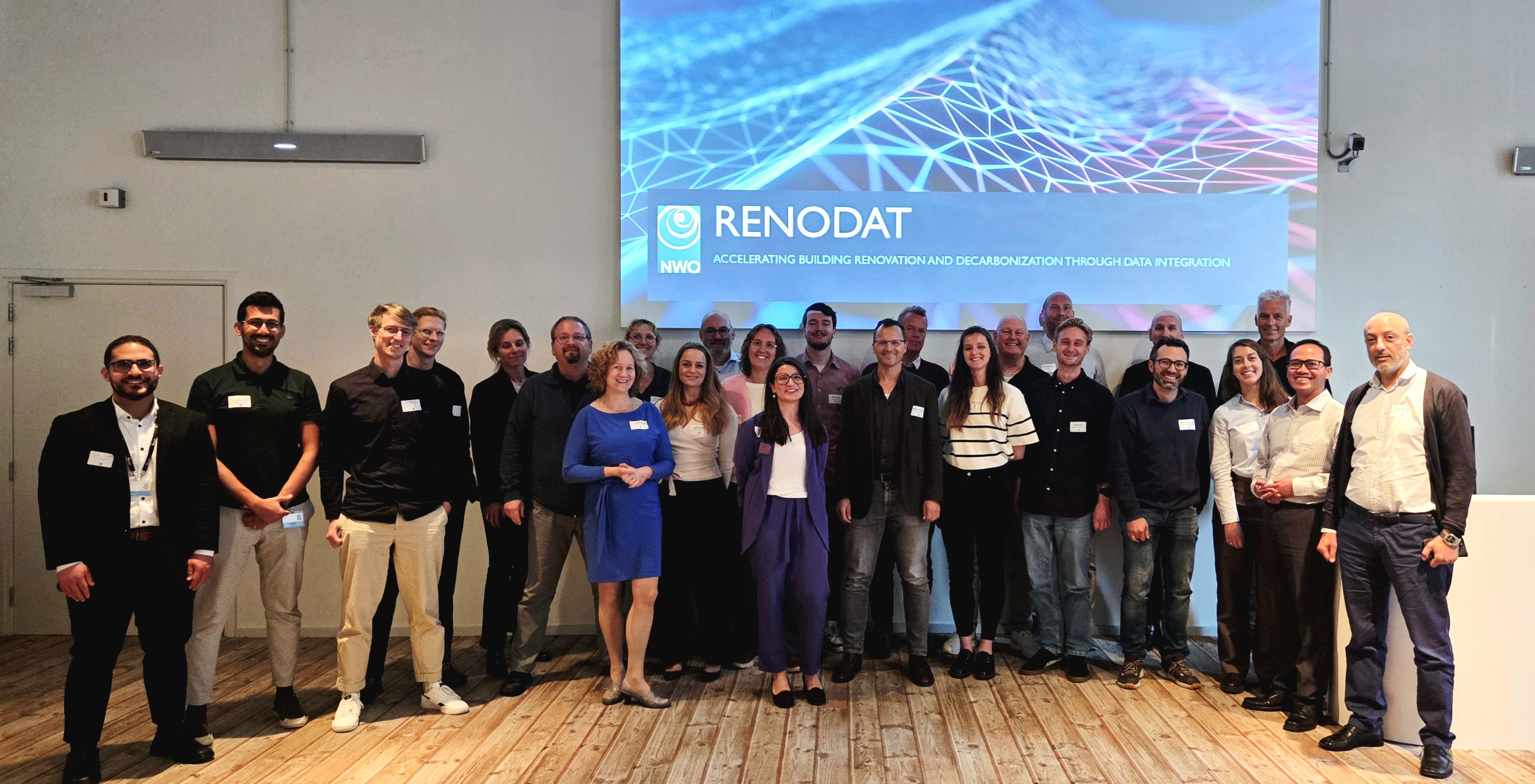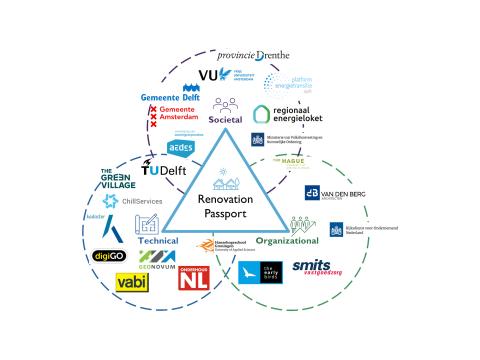RenoDAT: digital renovation passports for dwellings
This project aims to accelerate the decarbonization of the Dutch built environment by enabling the large-scale adoption of renovation passports.
Centre of Expertise Mission Zero

Together with TU Delft, VU Amsterdam and Hanze UAS Groningen; the Future Urban Systems and Energy in Transition research groups are developing Digital Renovation Passports for existing homes. This 4-year project supports Dutch and EU policies on large-scale sustainable renovation, with backing from institutions such as Kadaster, the Ministry of Housing and RVO. Our project focuses on harmonization and interoperability of public data, industry data, and household data to enable effective renovation strategies for the Dutch housing stock. This projects supports the EU policy directive in accordance with article 12 of the EPBD IV where The Netherlands as an EU Member States will put in place a renovation passport scheme in 2026. By combining research and practice, we aim to make renovation advice more accurate, inclusive, transparent and data-driven, while also strengthening the skills and digital capacity of the construction sector.
Reason
As the Netherlands works to decarbonize its built environment, the pace and quality of renovations remain insufficient to meet climate targets. A major barrier is the lack of transparent, accurate, and standardized building data. Currently, renovation solutions rely on assumptions and fragmented datasets, resulting in underperforming buildings, wasted resources, and repeated data collection. The EU recognizes the importance of standardized data through instruments like the Renovation Passport and Digital Building Logbooks, but their success depends on solving technical, ethical, and governance challenges.
Sensitive issues such as ownership, privacy, liability, and citizen trust remain unresolved. Homeowners—often the only source of information on a building’s history—are rarely empowered to contribute effectively, while small construction firms face labor shortages that slow renovation uptake. Without systemic solutions, data continues to be recollected ad hoc, instead of reused across the renovation value chain. By ensuring building data is uniform, secure, and reusable, Renovation Passports could streamline processes, improve renovation quality, and reduce pressure on the limited workforce. RenoDat addresses these gaps through transdisciplinary research into governance, ethics, and harmonization of building data.
Key challenges and assumptions
- Technical: Highly fragmented data practices create inconsistent quality, interoperability issues, and prevent data reuse, wasting time and resources.
- Economic: Weak incentives for stakeholders to store and share building data, combined with a critical shortage of skilled labor and limited digital capacity in the construction sector.
- Legal: Ambiguities around data ownership, privacy, and transfer with property ownership hinder secure and responsible implementation of Renovation Passports.
- Social: Homeowners, volunteers, and small construction actors lack empowerment, training, and incentives to engage with large-scale digital building data systems. Low-income households face additional barriers, risking unequal outcomes.
- Environmental: Renovation Passports are key to improving building quality and accelerating the energy transition, ensuring renovations are based on actual data rather than assumptions.
Objective
The RenoDat project aims to accelerate the decarbonization of the Dutch built environment by enabling the large-scale adoption of Renovation Passports. These digital tools are essential for closing the energy performance gap, improving renovation quality, and supporting the Netherlands in reaching its climate neutrality goals. RenoDat tackles the technical, legal, and social barriers to data-driven renovation by developing standardized data frameworks, training the workforce, and empowering homeowners and communities.
Through a transdisciplinary approach, the project will deliver societal, environmental, and economic benefits in the short, medium, and long term. By aligning public bodies, construction firms, SMEs, and homeowners, RenoDat strengthens the renovation ecosystem, while ensuring that building data becomes a shared, trusted, and actionable resource for accelerating the energy transition.
Expected impacts
Short-term
- Raise awareness and increase stakeholder engagement with Renovation Passports (homeowners, housing associations, SMEs, municipalities).
- Establish a Learning Lab to train volunteers and construction workers, addressing labor shortages and skill gaps.
- Develop frameworks for standardized data collection, interoperability, and sharing.
Medium-term
- Achieve measurable reductions in household energy consumption through data-driven renovations.
- Boost competitiveness of SMEs in the construction sector by improving productivity and efficiency.
- Empower homeowners and volunteers with reliable renovation data and tools, ensuring more equitable outcomes.
Long-term
- Substantially reduce CO₂ emissions from the housing sector, supporting 2050 climate neutrality goals.
- Mitigate energy poverty and improve health by enabling deeper, higher-quality retrofits.
- Preserve building value through reliable renovation histories and better planning.
- Stimulate new business models and economic growth in digital renovation services.
- Mitigate labor shortages by streamlining renovation workflows and training the workforce.
- Contribute to EU-wide frameworks and adoption of Renovation Passports and Digital Building Logbooks.
Research approach
RenoDat takes a holistic and transdisciplinary approach to developing the data infrastructure needed for Renovation Passports. By combining technical innovation with social, legal, and organizational insights, the project will create standardized, ethical, and interoperable systems for building data. This includes integrating public and private datasets, automating data collection, and exploiting geospatial resources such as BIM models and 3D-BAG to strengthen the national “geo-data fundament.”
Beyond the technical dimension, RenoDat places strong emphasis on the homeowner journey, behavioral change, and democratic engagement with data. The project also addresses organizational models for data ownership, incentives for stakeholders to share and maintain data, and workforce challenges by enhancing data literacy among construction professionals, volunteers, and future workers. The work is structured into seven interlinked Work Packages (WPs), each focusing on a specific dimension of the Renovation Passport.
Focus areas (Work Packages)
- WP1: Data requirements and data governance for Renovation Passport.
- WP2: Renovation Passport adoption and integration.
- WP3: Effective renovation advice for homeowners and property managers.
- WP4: Ethical homeowners' engagement on data sharing and renovation values.
- WP5: Business model for Renovation Passport, data sharing and ownership.
- WP6: Future-proof labor market and data-skilled professionals.
- WP7: Project management, dissemination, coordination.
Final Output / Intended Results
FUS and EiT will focus on the following work packages.
WP3: Effective renovation advice for homeowners and property managers.
THUAS contributes to the evaluation and testing of new data-driven methods for providing personalized energy renovation advice through the Renovation Passport.
- Together with partners, THUAS helps define systematic evaluation methods to measure the effectiveness of energy advice, focusing on both energy performance improvements and homeowner satisfaction.
- THUAS plays a key role in testing these methods in real-life case studies, generating insights into their practicality and impact.
WP4: Ethical homeowners' engagement on data sharing and renovation values.
- THUAS leads efforts to ensure that the Renovation Passport aligns with homeowner values and privacy concerns, particularly by applying behavioral economics to increase engagement.
- THUAS designs and implements behavioral interventions (e.g., nudges, defaults, social norms) to encourage homeowners to share data responsibly while maintaining trust and control.
- This work directly contributes to building confidence in the system and ensuring its ethical use.
WP6: Future-proof labor market and data-skilled professionals.
THUAS plays a central role in bridging research, education, and industry to prepare the workforce for data-driven renovation practices.
- THUAS co-develops training programs with partners, ensuring relevance to real-world construction challenges.
- THUAS supports the integration of digital skills and sustainable construction practices into curricula, making these competencies part of long-term educational frameworks.
- THUAS actively engages in reskilling and upskilling the existing workforce, with a strong focus on hands-on, practical learning for adapting traditional renovation processes to digital and data-driven approaches.
THUAS research project manager
- Rizal Sebastian (Professor Future Urban Systems)
Involved researchers
- Baldiri Salcedo Rahola (Associate Professor Energy in Transition)
- Danielle Strydom (Researcher Future Urban Systems)
- Bram Muller (Research Assistant Future Urban Systems)
Project start and end date
Start: September 2025
End: August 2029
Involved degree programmes, faculties and/or minors
- Research Group Future Urban Systems
- Research Group Energy in Transition
- Centre of Expertise Mission Zero
- Faculty Technology, Innovation & Society
- Bachelor programme Architectural Engineering
- Master programme Next Level Engineering
- Minor Smart Building Information Management
Funding
NWO
Partners
- TU Delft
- VU Amsterdam
- Hanze UAS Groningen
